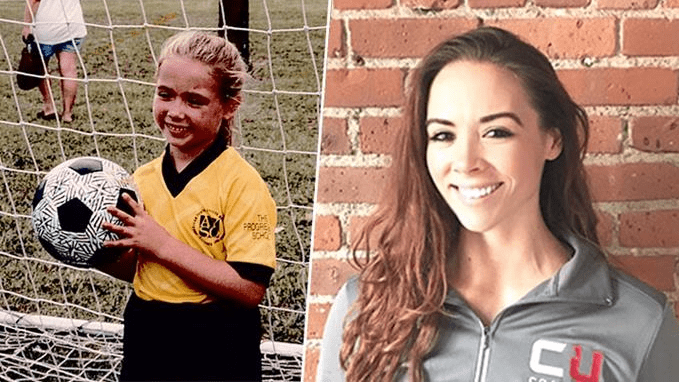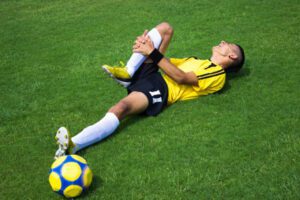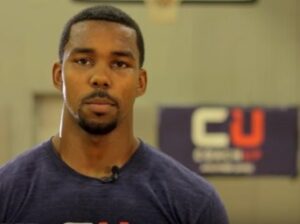I lived for, breathed for, trained for and thought about my next game and tournament all the time. My mom, God bless her, drove me to countless practices, tournaments and games across the state just about every weekend and bought me pair after pair of (expensive) goalie gloves. She listened to me as I complained about the ref who made a bad call, my defensive line not listening to me as I directed them, and let me go on and on about each and every save I made—or goal I let up—and let me dissect the plays that led up to the them and what I would do next time. She even drove me to the doctor the three times I fractured my foot…and the three times I broke a finger (PS: if you’re a goalie, do yourself a favor and get finger protector gloves, they really do help. My personal favorite brands are Reusch and Adidas.)
But all the work, the frustration, the glory, the injuries, the late nights, the early mornings—I lived for it.
————————-
I started playing soccer when I was 6 years old, and I took to the game immediately. I loved that I could run around, I loved that I could kick something, and I loved having the ability to compete—I’ve always been a particularly competitive person, and especially as a kid. Soccer gave me an outlet to focus that energy and filled that need.
The 9-11 age range tends to be when the kids with more athleticism or talent emerge, and when I was 9, a local club approached my parents about me playing for them, and of course I wanted to do it.
My early club days were the best. I didn’t start playing goalkeeper until my freshman year of high school, so at this time I played defense, and found my spot as sweeper. I loved being the dominant force in the defensive line and just soaked up learning how to read the game. Aside from growing into my position and the game in the early days, I made friends outside of school—they were my club friends.
Club friends are a special group of friends growing up—you navigate learning how to work together and physical progress and skill development, but you also experience the joys of just being a kid together.
We’d follow up a dedicated conditioning practice with a water fight. We would play three games in a day at a tournament then back at the hotel we’d sing our lungs out while running in the hallways. We had fun, we played soccer…and we were kids.
I stayed with that club for several years, developing my skills as sweeper. We had a few different coaches throughout the years, but one coach named Terry was brought in to help out at one point. Terry was great with kids—he made the practices fun and engaging, and he had a wealth of knowledge to offer us each practice. He was the perfect mix of serious and understanding. He never really eased up on us, but knew how to encourage us. Even as a young kid, I could feel how good of a coach he was.
————————-
As I entered my freshman year of high school, our team didn’t have a goalkeeper and my coach approached me about it, thinking I could be a good fit because of my height and my knowledge of the game. I didn’t want to, but I’ve never been one to turn down a challenge, so I agreed.
I went into the season with no real idea what to do. My brother played goalkeeper for a few years at the recreational level, so he gave me some basic tips prior to our first game, but I remember walking onto the field with my stomach turning. I was a freshman, playing goalie in my first game, and not really sure of what I was doing. We were playing a school new to our district, so I didn’t really even know what to expect from them. I was ready to fight of course—that’s always been in my nature—but I was sure I was going to get my butt handed to me. We won 10-0, and I didn’t touch the ball once.
Though my first game as goalie didn’t give me any real experience, what it did do was introduce me to the mental side of being a keeper – the anticipation, the nervousness, the need to be a leader on the field – and I loved it.
Through some mutual connections, my high school brought in my former coach, Terry, to work as an assistant for the team.
Quickly seeing the need for me to have personal, dedicated goalkeeping instruction, Terry offered to start working with me individually—and I can say with full confidence that the decision to work 1-on-1 with Terry was one of the best decisions I have ever made.
I started working with Terry outside of our team practices once a week, and we worked on everything—angles, footwork, hand-eye coordination, basic positioning and awareness, agility, form, reaction time—you name it, we practiced it. Terry taught me the importance of coming out to cut off the angle, how to protect myself as I’m diving at a striker’s feet, and how I am never, ever, ever, ever to let a goal up on the near post (I should always cut the angle off so that I can cover the near post with two hands and far post with one.)
Our practices were intense. I was not in goalkeeper shape, and he was determined to get me there. My weekly sessions quickly turned into multiple training sessions each week. Each Saturday at 8am, from the time I was 14-18, I was at the field with Terry. Our sessions also included group training.
I met goalies from competing schools, and got to train with keepers, both male and female, from much larger programs than my own. I went to a small private school, and through Terry, I was able to train with the biggest, best keepers in the county, in a small group setting. I learned so much from them, and later I’d found out that they learned from me too.
I absolutely loved everything about being a goalkeeper—the mental challenge, the feeling of being responsible for winning or losing (I know it’s a team thing, but still), the physicality and aggressiveness—it fit me to a T.
I improved quickly, and just like when I first started playing the beautiful game, I soaked up everything. By the time I was a sophomore, I had been training with Terry consistently for a year, and that year I led my high school team in a record-breaking season – we finished 16-6, made it to regional semi-finals (the furthest the program had ever gone), and I personally finished with 11 shutouts.
My quick improvement was met with Terry inviting me to play for the club team he coached. I eagerly accepted, knowing I would be challenged on this new team…and I was. The team had been playing together since they were kids, and I needed to prove myself to them…and their parents (sports parents can be rough).
Between team practices and individual training with Terry, I was at the field 6 days a week—and I would have been there 7 if I could.
Winter of my sophomore year, a u-18 club in the area was playing in a fairly large international tournament in Miami over Christmas break. Their keeper had to cancel last minute, and one of their players who was on my HS team recommended to their coach that I guest played with them. Given that we had no real time for a tryout or trial of any sort, she vouched for me and the coach agreed.
Let me tell you, these girls did not want me there. Not only was I not their keeper, they had never seen me play, I was two years younger, and played for a smaller club and for a small private school.
In their minds, the odds were against me; in mine, it was an opportunity to prove myself.
We crushed this tournament.
We played teams from Jamaica, Canada and another team from Florida in our group. We won all three games, 2-0, 2-1, and 3-0. We moved on to semi-finals, in which we played a team from somewhere in the midwestern US – and it was a tough game. It went into double OT and ended with a 1-1 tie, which meant penalty kicks. By this time in the tournament, the team and I were aligned, and they were fully confident in me. Little did they know I had never participated in a shootout as a goalie before! Sure, I had PKs taken on me in games, but never an actual shootout. But I was locked in. First round, we tie 3-3, and we go to the second round and it’s back and forth – their 5th kicker comes up, and we are up 3-2, meaning, if I stop this, we win.
I’ve heard a lot of people who have never played goalkeeper say that they would hate penalty kicks—that it’s unfair advantage to the shooter, they should be farther back, goalies should be able to step out, etc. And while all valid points for discussion, I can tell you that as a keeper, none of that matters to you. At the moment, it’s you and the shooter.
If you let anything else enter your mind, like annoyance at the distance or that they have an advantage, you’ve already lost.
The shooter sets up, and I look at her positioning—her body angle, her steps, her foot positioning—just as Terry had taught me, and I swear, this girl was like a kid’s book—so easy to read. Based on how she was set up and her approach, I knew she was going left and low. And she did—and so did I. I blocked the shot, we won, and the team ran out, jumping all over me. With all that was happening, I didn’t even realize that so many other teams and spectators had stopped to watch the shootout, and that we had literally hundreds of people watching this moment. To this day, that was one of the most exciting few minutes of my life.
We went onto the finals to lose a tough match 1-0, but the entire experience of the tournament opened my eyes to what I could feel—and how I could perform—in this game.
With this momentum, I continued my training with Terry, and made the transition from newbie to veteran, assisting him as new keepers joined the group training.
I didn’t realize then, but do now, how much he was helping me in my own leadership development, and how he was fostering my desire to pursue leadership training and roles in the future.
As my high school and club career developed, I started to receive interest from some colleges, mostly smaller schools, which I was good with. I was an above average goalkeeper, but I was no Hugo Lloris (COYS), and I knew that I was likely not quite Division 1 level. After speaking with a couple coaches, and doing spring workouts with some teams, I set my sights on a D3 school in the midwest. I did the campus visit, met with the coach, met a few players on the team, and it was decided – I committed that day.
My college career was cut short by a lingering injury after my freshman year, which frustrated me tremendously at the time. In hindsight, though, I’m able to see that, though I didn’t play all four years and become the best goalie in the NCAA like I wanted to, my experience playing soccer did SO much for me. I was healthy and motivated all of my teen years, I learned leadership and confidence skills that I could apply to my life, I felt I had direction and a purpose, I developed a work ethic that I am proud of to this day, plus on top of all that, I made some of the absolute best friends of my life through playing in college. And I truly believe none of that would have happened had my training not been jumpstarted and accelerated with Terry.
Obviously, with my past experience and now working in marketing for CoachUp, I am an advocate of private and small group training. If you’re considering it, either for yourself or your child, I encourage you to give it a try. You really don’t know what benefits you’ll receive from it, or where it could lead you.
CoachUp is the safest and easiest way to find a coach for personalized training. With our 100% money-back guarantee and vetted coaches, anyone can achieve their full athletic potential. Find your perfect coach today and become the athlete you want to be!
How useful was this post?
Click on a star to rate it!
Average rating 0 / 5. Vote count: 0
No votes so far! Be the first to rate this post.



